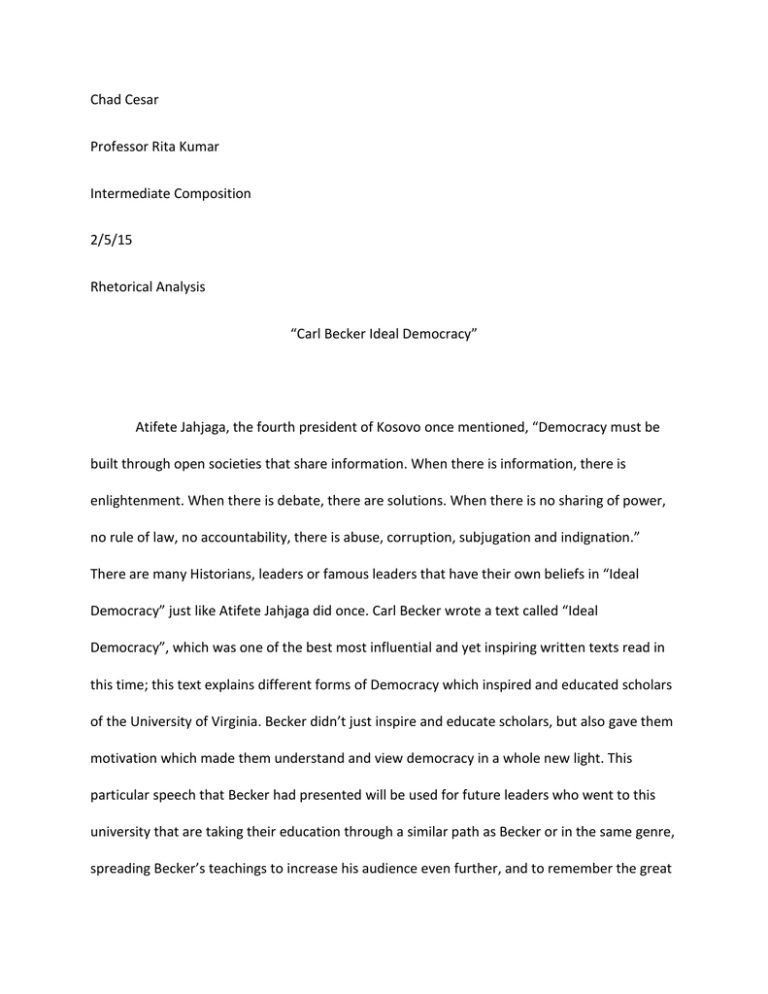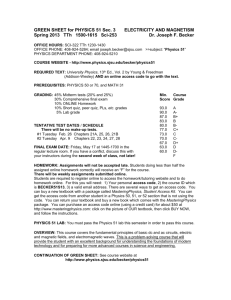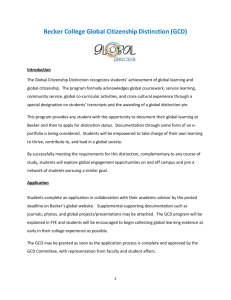Carl Becker Ideal Democracy
advertisement

Chad Cesar Professor Rita Kumar Intermediate Composition 2/5/15 Rhetorical Analysis “Carl Becker Ideal Democracy” Atifete Jahjaga, the fourth president of Kosovo once mentioned, “Democracy must be built through open societies that share information. When there is information, there is enlightenment. When there is debate, there are solutions. When there is no sharing of power, no rule of law, no accountability, there is abuse, corruption, subjugation and indignation.” There are many Historians, leaders or famous leaders that have their own beliefs in “Ideal Democracy” just like Atifete Jahjaga did once. Carl Becker wrote a text called “Ideal Democracy”, which was one of the best most influential and yet inspiring written texts read in this time; this text explains different forms of Democracy which inspired and educated scholars of the University of Virginia. Becker didn’t just inspire and educate scholars, but also gave them motivation which made them understand and view democracy in a whole new light. This particular speech that Becker had presented will be used for future leaders who went to this university that are taking their education through a similar path as Becker or in the same genre, spreading Becker’s teachings to increase his audience even further, and to remember the great leader that he became to have an understanding of the importance of democracy in such a high caliber. Carl Becker’s pieces where astonishing and very intellectual, but to fully understand why or how he made such spectacular pieces, you have to understand him as a person. His full name was Carl Lotus Becker and he was born on the 7th of September, 1873 in Black Hawk County, Iowa and passed away April 10th, 1945 in Britannica. Before his death, he accomplished a whole lot in his life; he studied at Columbia University and University Of Wisconsin where he worked with one of the most distinguished and influential theorists of American history, Frederick Jackson Turner. Being under the wing of Turner is when Carl Becker became infatuated with Early American history. Becker was known for not only for his famous written work but being able to further his belief that history is not just simple facts and boring lectures like normal people think but it’s really about the perspective and ideals of the historian. In the article “Ideal Democracy”, written by Carl Becker, he uses abundance of different rhetorical strategies in order to help people understand and persuade the audience. These strategies include the usage of exceptional rhetorical questions, itemizes, uses cause and effect, and comparisons. With the strategies he provides, and helps people understand his craft and him as a person; Becker makes people see the true meaning of democracy and with that, it has opened new doors for thinking in a way that the norm won’t be able to. In the text, Becker uses very few rhetorical questions to make the reader bring forth the thought process and the interest to keep the audience intrigued. By doing this, his plan is to connect with them on a certain mental level and to give the audience some time to comprehend or to break down his words. When the audience reads towards the end of part 1, Becker stated and made a question such as, “They tell us democracy, so far from being triumphant, is ‘at the cross roads’ or ‘in retreat’, and that its future is by no means assured. What are we to think of this sudden reversal in fortune and prestige? How explain it? What to do about it?” When he said this, he made the audience think and makes conclusions for them about what they read in part 1 of the reading. One thing about Becker is that he never gives a straight forward answer, but instead in the entire reading Becker pushes the audience to make their own logical conclusions which made his audience provide many answers instead of just a particular type; this was a brilliant move that he did, since Becker wasn’t looking for a certain answer but all different types of answers. The second strategy that Carl Becker uses is itemizes or listing great facts. Reading throughout the whole text, he presents all his points in a direct matter but also decisively as well. When reading his text, you have no time to stop and decode what he is saying since Becker lays out everything straight forward without beating around the bush; you can feel and understand the thought patterns he brings out to the world. In the reading Becker talks about the people who are expected to be found in a successful/ financially stable democratic environment. These kinds of folks have the “the capacities and virtues of men…with certain material and intellectual conditions…to exercise these capacities…”. Another way that Becker itemizes very well in his writing is by listing how communication is very important for democracy to flourish. He gives examples of history of mankind which he states “democracy never flourished in both the Persian and Roman empires except in respects to purely local affairs…”. Becker Itemizes to bring forth ideas which are listed back to back. He used this strategy to give the audience information they need in a swift matter so they can create or form their own conclusions of his own thought patterns. The cause and effect is one of the other rhetorical strategies that Becker uses in his writing. He breaks down and simplifies his piece by easily defining and providing clear ideas on why certain events and ideas become. He leaves a very clear clue which leaves no type of misunderstanding; he also shares his belief on the reason why the United States isn’t divided into small republics. The United States isn’t divided into small republicans is because of the telegraphs and railroads which was made to communicate easier in a country as vast as this; he states that the “essential conditions for the success of a democratic government is mobility, ease of communication, another is certain measure of economic security”. Many can clearly say that the effect called an ideal democracy is caused by the point stated. Another great example is that a certain amount of wealth must be achieved by the population in order for them to be educated and not be worried about survival in order to devote time for the upkeep of a democracy. Becker uses cause and effect in a way to make his speech easier to comprehend which can prove his ideas through real world examples. The last rhetorical strategy that Becker uses greatly is comparisons; in the entire speech it provides these comparisons from the beginning till the end. When he uses comparisons, he creates a form of understanding to give everyone a basic definition of the term democracy. In the text it states, “Democracy like liberty, or science, or progress, is a word”. In this sentence, he compares the term democracy to different terms which can help readers/audiences to understand better. Becker goes on comparing democracy to “a kind of conceptual Gladstone bag which, with a little manipulation, can be made to accommodate almost any collection of social facts we may wish to carry about in it”. In this comparison, Becker recapitulates that the term democracy can mean many different things to people since people think differently from one another. In this text, Becker uses these kinds of comparisons to show the audience what democracy is not. When he gave his meaning or definition of what democracy means, he compares the word democracy to many different leaders that use the term in an improper matter. An example that Becker uses is, “Peisistratus, supported by a majority of people, but his government was never regarded as a democracy.” Just by announcing this and showing great comparisons, he was able to maintain and keep the audience’s attention no matter what era it is; no matter what kind of government it might be, democracy is not what the government might claim it to be. Work Cited Carl L. Becker,"The Ideal" and "Afterthought on Constitutions" from Modern Democracy and from Yale Review. XXVII,+55.1941. Rhetoric is a form of art that you use to get your arguments and your points across in an effective way; this may include the art of persuasion or ways to understand/educate others on your material or others. It can also be used as a blueprint to lay out a form that can discipline students for training purposes, to understand the language or how language is used in an oral and writing form, and to correctly use this form of language in your own writings and orally. It is very important to learn rhetoric because just by comprehending the language you can apply this in your own work which can help the audience you are writing to, to follow your words or understand what you trying to teach in a better format. Another reason why it is important is because it is being used all around us 24/7 by sometimes being cautious of it or not knowing we do it at all; It consist of our daily conversations, the TV/movies we watch, advertisements, the books we read, gestures, and art that we create. Discourse community is group of people that have goals that are common or have the same interest in a certain genre which can be discussed in a public venue. For the most part, these types of groups have very similar careers/jobs or personal goals. It is important to know about discourse communities because learning the major points of it; you can develop your own writing and speaking preferences or peculiarity. You can use an understanding of these differences to make your writing stronger. This starts with identifying what a discourse community is and why it is so important to know of it.




